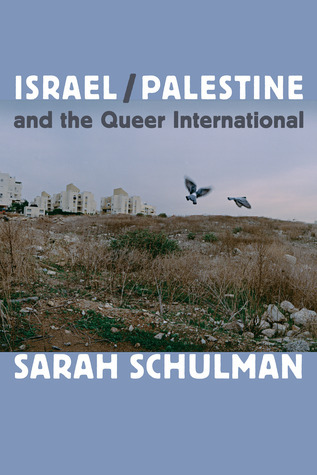Paperback, 193 pages
English language

Paperback, 193 pages
English language
In this chronicle of political awakening and queer solidarity, the activist and novelist Sarah Schulman describes her dawning consciousness of the Palestinian liberation struggle. Invited to Israel to give the keynote address at a LGBT studies conference at Tel Aviv University, Schulman declines, joining other artists and academics honoring the Palestinian call for an academic and cultural boycott of Israel. Anti-occupation activists in the United States, Canada, Israel, and Palestine come together to help organize an alternative solidarity visit for the American activist. Schulman takes us to an anarchist, vegan cafe in Tel Aviv, where she meets anti-occupation queer Israelis, and through border checkpoints into the West Bank, where queer Palestinian activists welcome her into their spaces for conversations that will change the course of her life. She describes the dusty roads through the West Bank, where Palestinians are cut off from water and subjected to endless restrictions while Israeli …
In this chronicle of political awakening and queer solidarity, the activist and novelist Sarah Schulman describes her dawning consciousness of the Palestinian liberation struggle. Invited to Israel to give the keynote address at a LGBT studies conference at Tel Aviv University, Schulman declines, joining other artists and academics honoring the Palestinian call for an academic and cultural boycott of Israel. Anti-occupation activists in the United States, Canada, Israel, and Palestine come together to help organize an alternative solidarity visit for the American activist. Schulman takes us to an anarchist, vegan cafe in Tel Aviv, where she meets anti-occupation queer Israelis, and through border checkpoints into the West Bank, where queer Palestinian activists welcome her into their spaces for conversations that will change the course of her life. She describes the dusty roads through the West Bank, where Palestinians are cut off from water and subjected to endless restrictions while Israeli settler neighborhoods have full freedoms and resources. As Schulman learns more, she questions the contradiction between Israel's investment in presenting itself as gay friendly—financially sponsoring gay film festivals and parades—and its denial of the rights of Palestinians. At the same time, she talks with straight Palestinian activists about their position in relation to homosexuality and gay rights in Palestine and internationally. Back in the United States, Schulman draws on her extensive activist experience to organize a speaking tour for some of the Palestinian queer leaders whom she had met and trusted. Dubbed "Al Tour," it takes the activists to LGBT community centers, conferences, and universities throughout the United States. Its success solidifies her commitment to working to end Israel's occupation of Palestine, and kindles her larger hope that a new "queer international" will emerge and join other movements demanding human rights across the globe.
Sarah Schulman is a longtime AIDS and queer activist, and a cofounder of the MIX Festival and the ACT UP Oral History Project. She is a playwright and the author of seventeen books, including the novels The Mere Future, Shimmer, Rat Bohemia, After Delores, and People in Trouble, as well as nonfiction works such as The Gentrification of the Mind: Witness to a Lost Imagination, My American History: Lesbian and Gay Life during the Reagan/Bush Years, Ties That Bind: Familial Homophobia and Its Consequences, and Stagestruck: Theater, AIDS, and the Marketing of Gay America, which is also published by Duke University Press. She is Distinguished Professor of the Humanities at The City University of New York, College of Staten Island.
"This is an extraordinary, challenging and moving book. It is both an honest account of the work Sarah Schulman had to do to allow the full reality of the occupation of Palestine to be registered in her consciousness, and a story – told firmly yet gently, with patience and care– of the shared labour of building activist worlds on occupied grounds. We embark on a journey with Sarah Schulman and many other activists, from Palestine, the US and beyond, as they persist in the effort to make the liberation of Palestine essential to queer politics. We follow their footsteps, we trace the paths; we hear the conversations; we share the meals. If activism involves hard often painstaking work, if it involves mundane and ordinary tasks, we learn that it can also create connections that nourish and sustain. I hope this book becomes our teacher. I hope we join the invitation to become part of a new queer international where liberation for all is the common goal."—Sara Ahmed, author of On Being Included: Racism and Diversity in Institutional Life
"This is a great book, brave and compassionate. A journey of discovery, a coming of age, and more important, a search for justice. Our world is a better place for its existence. Read it, please." —Rabih Alameddine, author of The Hakawati